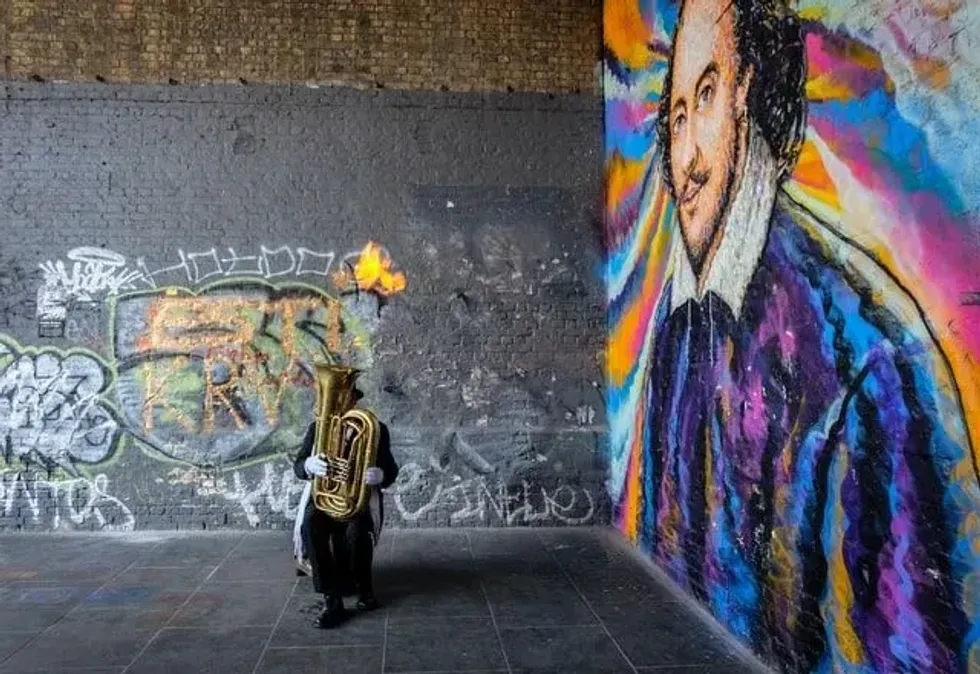Why Hamlet Madness Quotes?
Hamlet is one of the most impactful characters of William Shakespeare, represented as a tragic hero. The character appears in the play, 'The Tragedie Of Hamlet, Prince Of Denmarke'.
It is also the longest play written by Shakespeare between 1599-1601 and first performed on stage between 1601-1602. It is Shakespeare's longest play, with 29,551 words, written in Early Modern English.
Apart from the remarkable characters and a gripping story, Shakespeare holds onto his audience with impactful dialogue. The line from Hamlet, "To be, or not to be, that is the question" has remained a favorite saying for people through centuries.
The concept of madness is a dominant theme in Shakespeare's play 'Hamlet'. The playwright emphasizes madness by adding elements of death, deceit, despair, conspiracy, and ghost.
Trials and tribulations faced by some lead characters drive the play's plot. As the story advances, the decisions and actions of significant characters lead them into madness and their ultimate demise.
Shakespeare also explores the different forms of madness through the psyche of his characters. While Hamlet's madness is driven by vengeance, Ophelia's madness results from grief.
The madness behind Claudius and Gertrude's nature is due to greed and love, respectively. The play portrays the volatility of human emotions and the impossibility of assurance.
Overbearing emotions and uncertainty drive the tragic protagonist and others in his life into madness. This article presents some 'Hamlet' quotes about madness to help you understand its portrayal in the play.
Quotes From Hamlet About Madness

1. "How strange or odd soe'er I bear myself -
As I perchance hereafter shall think meet
To put an antic disposition on -" - Hamlet, Act 1, Scene 5
The conversation takes place in a remote part of the castle where Hamlet visits the Ghost of his father. The Ghost reveals to Hamlet that his uncle Claudius murdered his father, and Hamlet must avenge his death.
Hamlet plans to put on a mask of madness to spy on Claudius and determine if the Ghost is right. Ironically Hamlet already exhibits strange behavior. He repeatedly asks his allies, Horatio and Marcellus, to swear secrecy about the Ghost and his plan.
Hamlet slowly starts to blur the line between madness and sanity, unable to distinguish reality from pretense. The incident showcases Hamlet's descent into madness as his world turns upside down.
2. "What I have done
That might your nature, honor, and exception
Roughly awake, I here proclaim was madness." - Hamlet, Act 5, Scene 2
The conversation occurs between Laertes and Hamlet in the castle hall. They face each other in a fencing bout arranged by the king, Claudius.
Here, Hamlet tries to clarify Laertes' perception of him as a murderer. Hamlet is quite philosophical as he addresses himself in the third person. He denies being a culprit but instead claims his madness to be the reason for his actions.
3. "I am but mad north-north-west. When the wind is southerly, I know a hawk from a handsaw." - Hamlet, Act 2, Scene 2
In this scene, Hamlet is speaking to Rosencrantz and Guildenstern in a room within the castle. Hamlet defines his madness as a form of entertainment.
He explains that he only goes through occasional bouts of madness, similar to the sporadic, sudden winds from north-north-west.
In the second half of the quote, Hamlet uses the proverbial expression of the hawk and the handsaw, intending to warn his companions that he is quite aware and in his senses most of the time. He can still distinguish between what is familiar and uncommon, between a friend and a foe.
4. "If't be so,
Hamlet is of the faction that is wrong'd;
His madness is poor Hamlet's enemy." - Hamlet, Act 5, Scene 2
Here, Hamlet tries to confront Laertes before facing him in a fencing match arranged by king Claudius. Hamlet explains his actions in the third person.
He denies his involvement in doing any wrong to Laertes. Instead, he explains his madness to be the reason that led him to stab Laertes' father, Polonius. Hamlet implies that both of them were wronged by his madness and the reason behind it.
5. "The spirit that I have seen
May be the devil, and the devil hath power
T' assume a pleasing shape;" - Hamlet, Act 2, Scene 2
The line is from one of Hamlet's soliloquies, where he contemplates his descent into madness and wrongdoings. He understands that the Ghost he saw could also be the devil in the pleasing appearance of his father.
Hamlet accepts that he is sad and melancholy, which can drive him into madness. He plans to ensure the Ghost's revelations are indeed valid before giving in to the mad thought of avenging his father.
6. "If Hamlet from himself be ta'en away,
And when he's not himself does wrong Laertes,
Then Hamlet does it not, Hamlet denies it." - Hamlet, Act 5, Scene 2
This conversation takes place between Hamlet and Laertes in the castle hall. Through these lines, Hamlet tries to explain his condition to Laertes.
He reasons that his madness makes him a different person, a person he does not claim himself to be, like this madness had created a different version of Hamlet altogether. And when this 'persona' takes over to commit wrongdoings, Hamlet himself falls victim to them. The person that wronged Laertes was never the Hamlet he knew to begin with.
Hamlet accepts that madness has taken over him and denies being responsible for Polonius' death. Hamlet adds that his actions resulted from madness.
Quotes From Other Characters About Madness

7. "Poor Ophelia
Divided from herself and her fair judgment,
Without the which we are pictures or mere beasts." - King Claudius, Act 4, Scene 5
Here, Claudius talks about Ophelia's condition with his wife, Gertrude. Ophelia has been grieving the death of her father, Polonius. She loves Hamlet, who left for England, leaving her without any support. Claudius believes this grief led to Ophelia's sudden mad behavior as she roams around the castle singing peculiar songs.
8. "And there assume some other horrible form
Which might deprive your sovereignty of reason,
And draw you into madness?" - Horatio, Act 1, Scene 4
The line by Horatio is directed to Hamlet when the latter decides to follow the Ghost elsewhere. Horatio warns Hamlet by claiming that the Ghost only tempts him to be drawn to madness.
Horatio believes the Ghost might lead Hamlet to dangerous situations he cannot turn back from. By the end of the play, readers realize the irony behind Horatio's speculation as Hamlet gives into his mad intentions of revenge.
9. "It shall be so.
Madness in great ones must not unwatch'd go." - King Claudius, Act 3, Scene 1
In this scene, Claudius is speaking to his chamberlain Polonius in a room in the castle. Claudius is concerned about the reason behind Hamlet's mad behavior.
He is assured that Hamlet's madness is not due to love and plans to send him to England. Claudius knows that Hamlet has allies and holds a position of power. Thus, Claudius must control Hamlet's unpredictable behavior to secure his position as king firmly.
Quotes About Hamlet's Madness
10. "He is far gone, far gone. And truly in my youth I suffered much extremity for love; very near this." - Polonius (aside), Act 2, Scene 2
In this conversation, Polonius is speaking to himself about the strange transformation of Hamlet. Polonius believes that madness has struck Hamlet severely, resulting from the latter's love for Ophelia. Hamlet seems to have mistaken Polonious for a fishmonger. Thus, Polonius determines that Hamlet's madness has made him lose his awareness of the world.
11. "Your noble son is mad.
Mad call I it; for to define true madness,
What is't but to be nothing else but mad?" - Polonius, Act 2, Scene 2
In this scene, Polonius informs Gertrude and Claudius about Hamlet going mad. Although Polonius does not intend to hurt the house's reputation, he has no other way to present the information. He presents letters before the king and queen that Hamlet wrote to Polonius's daughter Ophelia. The letters indicate that Hamlet's madness results from his love for Ophelia.
12. "Thanks, Guildenstern and gentle Rosencrantz.
And I beseech you instantly to visit
My too much changed son." - Queen Gertrude, Act 2, Scene 2
In this scene, Gertrude and Claudius discuss Hamlet's transformation with his friends Guildenstern and Rosencrantz. The majesties request Hamlet's friends to spend time with him to help bring him back to his senses.
Claudius and Gertrude believe the two can find the unknown reason behind Hamlet's madness. In this line, Gertrude thanks Guildenstern and Rosencrantz for lending a helping hand to try to bring her son back from madness.
13. "Mad as the sea and wind, when both contend
Which is the mightier. In his lawless fit
Behind the arras hearing something stir,
Whips out his rapier," - Queen Gertrude, Act 4, Scene 1
The conversation occurs between Gertrude and Claudius in a room within the castle. Gertrude informs that Hamlet has become truly mad. She personifies Hamlet's madness as a windstorm over the sea. Gertrude adds that her son's madness led him to stab Polonius, the father of Hamlet's lover Ophelia, to his unfortunate death.
14. "Mad let us grant him then. And now remains
That we find out the cause of this effect,
Or rather say, the cause of this defect,
For this effect defective comes by cause." - Polonius, Act 2, Scene 2
Here, Polonius is speaking to Gertrude and Claudius about Hamlet becoming mad. He ensures the king and queen that his information is an unfortunate fact. Polonius adds that they must devise a plan to find the reason for Hamlet's madness. Polonius also interprets Hamlet's mad behavior as a defect resulting from a specific cause.
15. "Though this be madness, yet there is a method in't.-" - Polonius (aside), Act 2, Scene 2
In this scene, Polonius speaks to himself about Hamlet's strange behavior. Even though Hamlet is believed to have descended into madness, there seems to be something controlled in the uncontrollable.
When inquired by Polonius, Hamlet replies that he was reading about slanders against older men. Hearing the reply, Polonius realizes that Hamlet's madness is unexpectedly quite methodical. The incident makes him sure about the reason he thinks is leading Hamlet to the depths of madness.
You Might Also Like
'Taming Of The Shrew' quotes
'King Lear' quotes
'Twelfth Night' quotes
'The Tempest' quotes.










